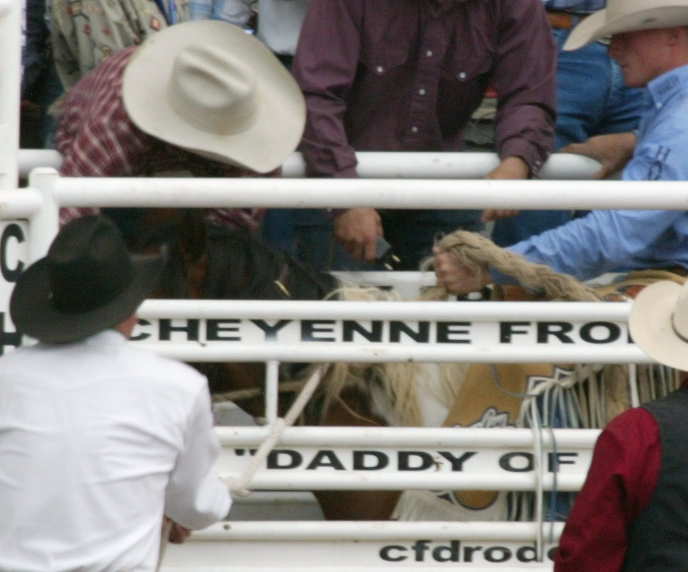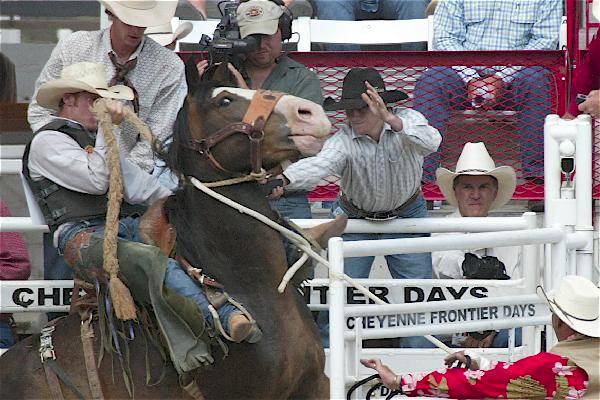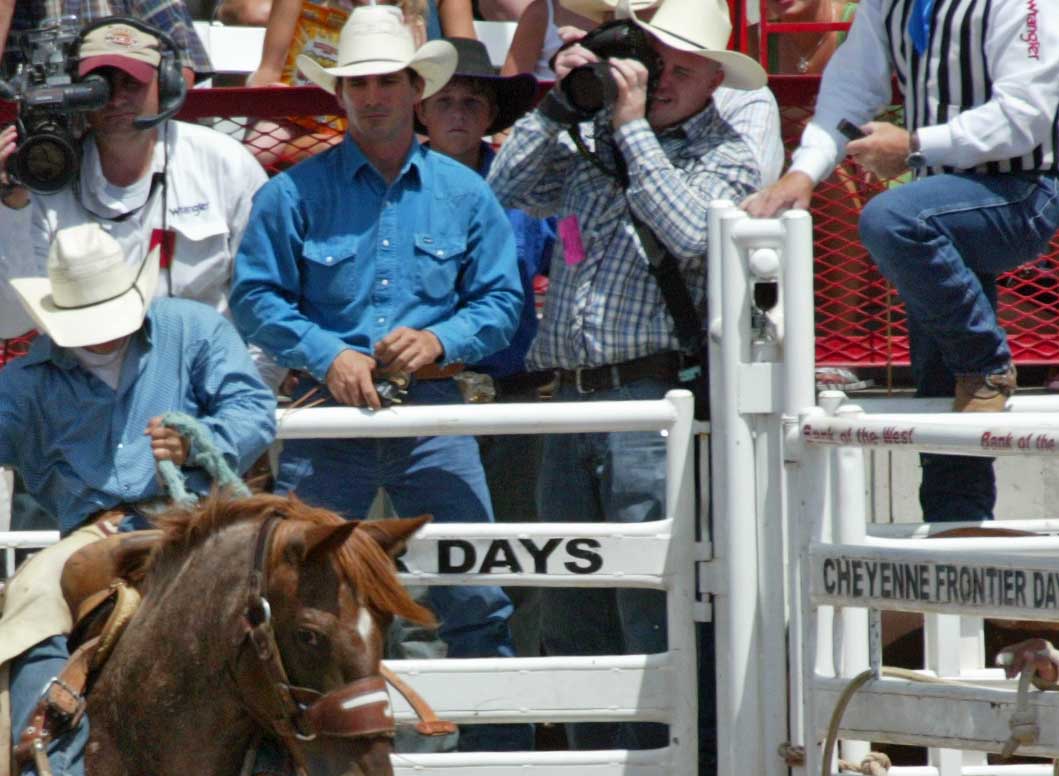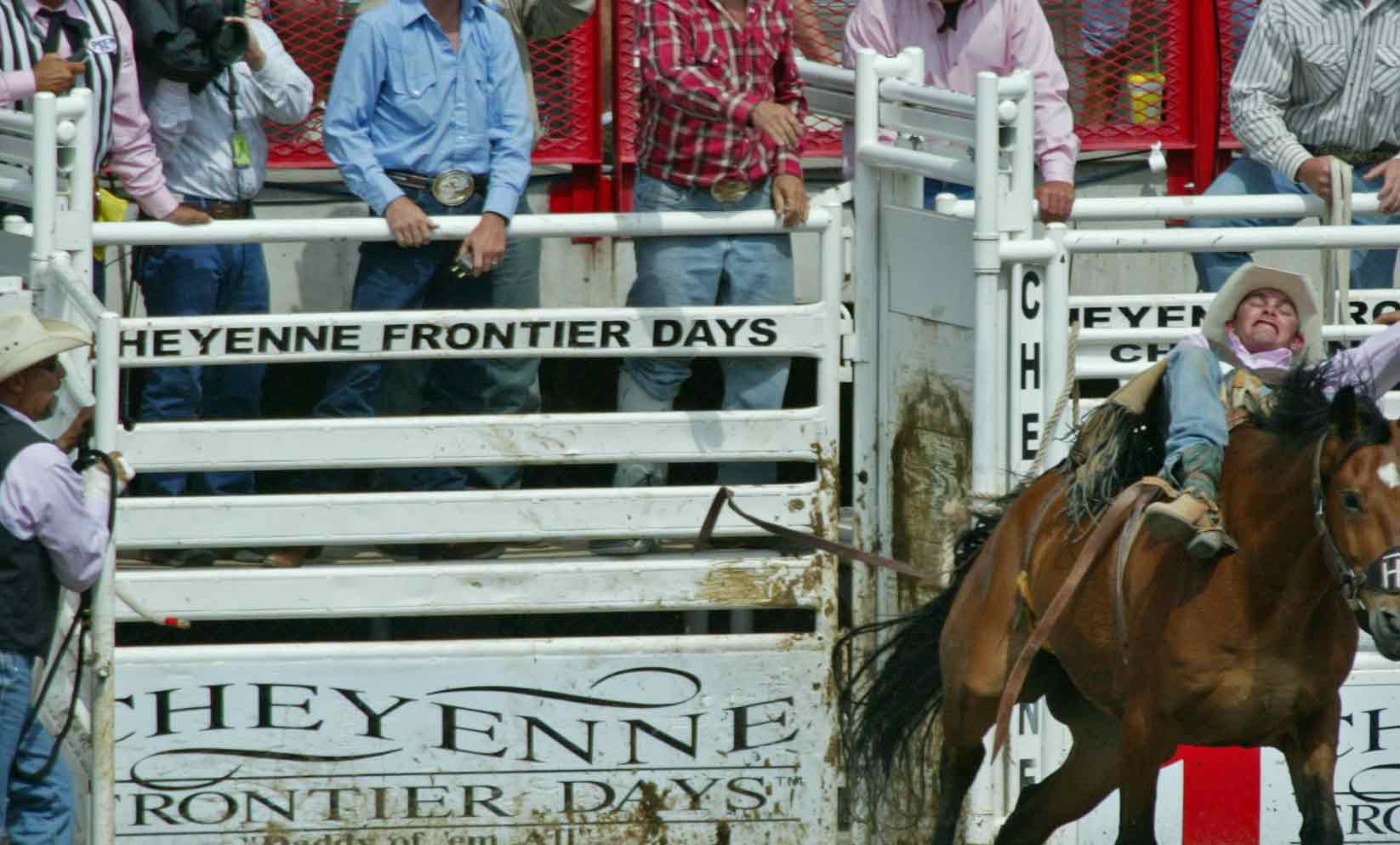A rodeo shocker
An unidentified man working the chutes at Cheyenne Frontier Days in July 2007 prepares to shock a bucking horse as he leaves the chute.

Animal-rights group says it has evidence of horses being prodded with electricity; rodeo officials insist practice followed PRCA rules
But it's unclear if any city ordinance was broken
August 2, 2007
Wyoming Tribune-Eagle
By Jennifer Frazer
CHEYENNE - An animal welfare group says its members observed consistent shocking of horses during this year's Cheyenne Frontier Days rodeo.
If true, that would be an apparent violation of a city ordinance and the Professional Rodeo Cowboys Association.
It has pictures and video to support its claims, members say, and they supplied some of those to the Wyoming Tribune-Eagle on Wednesday.
But CFD officials say judges at this year's rodeo enforced all PRCA rules diligently, and no violations occurred. The electric prods were used in accordance with PRCA rules to help keep both horses and riders safe, they add.
This horse is being shocked in the neck, against both the PRCA's "humane rules" and the prod device manufacturer's recommendations.

Whether a violation of city ordinance occurred is unclear.
Representatives of SHARK, Showing Animals Respect and Kindness, a Geneva, Ill.,-based group, attended all nine days of the CFD rodeo.
They sat in the B stand on the west side of Frontier Park and used still and video cameras with zoom lenses. They captured what they say was a pattern of consistent shocking of horses in the chutes across the arena.
The winner of this year's saddle bronc event won the title while riding a horse that was electrically shocked, said Steve Hindi, president of SHARK.
And the group was able to capture "dozens" of shockings over the course of the rodeo, he added.
Officials with shocking devices took pains to hide their behavior, Hindi said.
Two problems
This was a problem for two reasons, he said.
First, it was a violation of Cheyenne city ordinance.
Stock contractors were caught shocking horses and bulls at the 2005, 2006, and 2007 Cheyenne Frontier Days Rodeo, against the rodeo's supposed "humane rules." No disciplinary action was taken in 2005. In 2006 stock contractor Harry Vold was fined a paltry $250 when the shocking was exposed by the Wyoming Tribune-Eagle. But despite public outrage, Harry Vold was invited back to the 2007 CFD, and the CFD Rodeo received the PRCA's "Rodeo of the Year" award in 2005 and 2006. As can be seen in this photo, rodeo judges are aware of the shocking but never report it.
Cruelty and corruption pay in the rodeo industry.

That ordinance, Section 6.08.010(E) states that, "No person shall permit, induce or encourage any animal to perform through the use of chemical, mechanical, electrical or manual devices in a manner likely to cause physical injury, suffering or trauma to the animal."
Ordinance aside, Hindi said, some of the horses shocked were stalling - not moving once the gate opened. But many were not and were still inside the chutes when shocked.
"We heard this claim over and over and over again at Cheyenne: 'These animals are born to buck,'" he added. "But then when they don't buck, they're shocked to buck."
Hindi said the horses are really tame domestic animals that don't like the treatment they receive.
"The only reason they're bucking is they have a flank strap tied around them, they're getting spurred and when that doesn't work, they're electrically shocked," he added.
SHARK provided the WTE with 24 photos it says show shocking of horses. Most of the photos show different officials and riders.
The majority - 16 - show various rodeo workers just holding a shocking device behind chutes.
In four, officials can be seen reaching down toward a horse with a shock device in hand.
In two, an official is reaching out with the device, but the horse already is leaving the chute.
In one, an official can be seen touching a horse's neck with the device. In another, an official appears to be shocking a horse's hip.
But rodeo officials say PRCA rules allow shocking of horses that are known "stallers" before the gate is open. Doing so is both safe and humane, they say, and is preferable to not shocking them in this specific instance.
If the judge, contestant and stock contractor all agree a horse has the habit of stalling, they can agree to use an electric prod.
"They all know it's dangerous for a horse to be standing there and not sure what it's going to do," said Cindy Schonholtz, animal welfare coordinator for the PRCA. "Then they'll all agree ahead of time to lightly touch the horse on the hip or the shoulder to get it safely out of the chute."

'Ridiculous' idea
But Hindi said the idea that shocking a horse is acceptable because stalling poses a danger to horse and rider is ridiculous.
"If this horse poses a danger to the rider, if he's a chute staller, why is he in the rodeo?" he said. "If they're afraid (the horse) is going to explode - he's like a can of gasoline - then isn't the electric prod like a match?
"What should we do? How about if the guy gets off the horse?"
CFD officials issued a statement Wednesday in response to SHARK's accusations, saying they consider the care and handling of livestock that take part in the rodeo a top priority.
They said they met with judges, stock contractors and stock handling personnel to emphasize their commitment to proper care of both animal and human performers before the rodeo and before each performance.
After the rodeo was over, judges informed them that PRCA rules were followed diligently and no violations occurred.
But last year Harry Vold, owner of Harry Vold Rodeo Company, was disciplined by the PRCA for shocking horses, the CFD release says.
Vold, who returned to the rodeo this year, said his company was supervised by PRCA judges the entire time.
No excessive use
"There was never, ever any hot shot of any kind or prod used excessively around the bucking chutes. At all. Period," he said. "If an animal needed to be moved up in the chute - and that was very, very rarely, once or twice a performance - that was being supervised by PRCA judges."
Vold was at CFD nine days, he said, and he said he saw no symptoms of any animal being abused while being put into the chutes or bucking.
"We've come through Cheyenne with an enormous amount of animals in probably the best shape we ever did," he said.
Still, CFD officials seem somewhat ambivalent about the devices.
"If it was up to us, there would be no devices there," said CFD General Chairman Charlie West. "But we're under the guidelines of PRCA. Those rules were followed to a T, and to the best of my knowledge, no animals or riders were abused."
Vold said that if CFD asked him to stop shocking horses, he would. But he added the alternative would be to use a stick to move animals.
Electric prods move the animals quickly away without bruising them, he said, which is more humane. Using a stick takes more attempts to get results and can bruise animals, he said.
City code in play?
But Vold may be forced to stop using prods, depending on the interpretation of city code.
Last year city attorney Mike Basom sent a letter to CFD requesting more information on whether electric prods are likely to cause "physical injury, suffering or trauma" to horses.
PRCA official Schonholtz wrote back to Basom that PRCA has been continually advised by veterinarians that the judicious use of the prod is a safe and humane way to move livestock.
The prod is powered by flashlight batteries, and horses, with skin three times thicker than human skin, feel a "mild shock," she wrote.
One veterinarian quoted in the letter said he had been shocked himself with the device on several occasions during his 30 years of working with cattle.
"This type of shock was annoying but produced no lasting or harmful effects," he was quoted as saying in the letter.
Still, Mayor Jack Spiker said he had spoken with West prior to the rodeo and was left with the impression that no shocking would be occurring this year.
Code trumps rules
"City ordinance would trump any rules that they have out there," he said.
But it was not clear to Spiker whether the use of the prod does violate the city ordinance.
"We're not experts on what causes trauma to an animal," he said.
Basom was away on vacation Wednesday and could not be reached for an opinion.
Bob Budd, executive director of the Wyoming Wildlife and Natural Resources Trust and media director for CFD, said he couldn't comment on the city ordinance itself.
But he added that the point of the PRCA rule is to get animals out of the chutes safely and effectively.
"If you look at the ordinance, you aren't to do things that would cause injury," he said. "This is just the opposite - it's to avoid injury."
Hindi also said he was not trying to take CFD by surprise. When he testified against chuckwagon racing before the City Council, he told them he would be back.
Hindi said he plans to post eight to 10 10-minute videos of what he observed at CFD on youtube.com.
He also plans to visit the City Council with video and still pictures to urge the replacement of the Harry Vold Rodeo Company as stock contractor of CFD.
But he may not get a warm welcome, at least not from Spiker.
The mayor said he called Police Chief Bob Fecht on Wednesday to see if he had received a call from Hindi during CFD regarding a violation of the city's ordinance.
No, Fecht replied. This was the first he had heard of it.
Why, Spiker asked, contact the media days after the fact instead of the people who had the power to enforce city ordinance during the rodeo?
"(Now) the stock provider is gone," Spiker said. "Bringing it to our attention after the rodeo as opposed to during the rodeo puts us in a position where we can't do anything about it.
"How do you investigate it after everybody is gone? How do you issue a code violation after it's gone?" If a citizen sees a person get run over by a car, he asked, do they wait weeks to report it?
"The only conclusion I can come to is they're trying to embarrass Frontier Days instead of punishing the guilty people," Spiker said.
Dear Mayor Spiker,
After reading your quotes in today's newspaper article, I thought I would write and explain SHARK's position with respect to its investigation of CFD.
First, allow me to point out that our investigators attended Cheyenne back in 2005 and documented the same violations that we again documented this year. At that time we posted pictures on the Internet. Last year Cara Eastwood reported the same violations. I believe it was last November when I appeared at a city council meeting and spoke out against the possibility of chuckwagon races coming back to CFD. At that time I stated that we would attend the 2007 Cheyenne Frontier Days rodeo. Finally, I included you in recent correspondence sent to CFD leadership with regard to the use of still and video cameras, which I would think left absolutely no doubt as to our intention to attend, and exactly what we were going to do.
I am surprised that you would in any way hold us responsible for not reporting something that dozens of CFD volunteers and Cheyenne citizens were far closer to and chose to ignore. It is clear from our experience, as well as from Ms. Eastwood's article last year that this type of activity has been going on at CFD for a long time, and lots of people know about it. In fact, these violations go on, and have been documented by SHARK investigators at PRCA rodeos all over for well over a decade. Furthermore, Cheyenne is not the first rodeo where we have documented shocking by Mr. Vold's people.
I have no interest in fighting with you or the council, nor with CFD management. Today's article is an expose of the rodeo put on by the PRCA. It does indicate that there needs to be considerably tighter control by CFD management, but having met some of these people I would like to think that they want to do the right thing.
Know that what has come out today is only the tip of the iceberg. There is much more evidence, with video footage putting the abuses into context, and the picture will get more ugly before it gets better. We didn't cause it, we only pointed our cameras in the right direction. I cordially suggest that efforts go toward fixing the problems rather than to attack the messenger.
Please feel free to contact me at any point with any questions or comments you may have, and I trust that I may have the same access to you.
Kindest Regards, Steve Hindi, President





